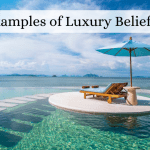Have you ever heard of luxury beliefs? You will today, and here’s a “you’re welcome” in advance
Luxury beliefs are a significant shift in how we might understand social stratification and cultural trends in contemporary society. The term was coined by Rob Henderson, who authored one of my favorite memoirs (even though it’s relatively new).
The term describes a set of ideas and values supposedly endorsed and spread by individuals from the upper echelons of society. They don’t espouse these beliefs for the pragmatic value in their own lives but as a marker of status, akin to possessing certain material luxury goods.
This post unpacks the nature of these beliefs, their implications, and the underlying psychology that fuels their adoption and dissemination.
The Nature of Luxury Beliefs
At the heart of luxury beliefs lies this notion; namely, that certain ideas, by virtue of affluent or educated people endorsing them, confer on their holders a kind of social capital that is distinct from, but analogous to, the status conventionally derived from wealth, possessions, or lineage.
These beliefs often challenge conventional norms and values, signaling the bearer’s intellectual sophistication and moral superiority. However, unlike material luxuries that are visibly consumed (hence easily identified as status symbols), luxury beliefs are intangible. They’re circulated through media, academic discourse, and casual conversation.
Luxury beliefs are not merely abstract philosophies; they actively shape social narratives and norms. They often pertain to critical social issues (e.g., those related to gender, race, and economic inequality), yet the elite who adopt said beliefs frequently lack a commitment to tangible action or a deep understanding of the complexities involved.
This paradox highlights a critical aspect of luxury beliefs: they are embraced because they are ideologically stylish and signal one’s in-group membership among the elite rather than from a genuine commitment to the principles they ostensibly represent.
What are Some Implications?
The propagation of luxury beliefs carries significant implications. First, when ideological lines distinguish elites from the masses, such beliefs erect a new form of social stratification. This hierarchy is not rooted in traditional markers, like wealth or occupation, but in the advocacy of certain progressive or contrarian ideas that are inaccessible or impractical for the broader population.

Consequently, luxury beliefs exacerbate social divisions, creating an echo chamber effect where the elite become increasingly disconnected from the experiences and concerns of the general public.
Furthermore, the phenomenon of luxury beliefs raises questions about authenticity and treating morality like a commodity. In a world where status is derived from the public endorsement of certain ideas, there is a temptation to adopt beliefs not because of conviction but as a means to an end; namely, gaining social recognition and prestige. Commodifying belief systems undermines honest discourse as ideas are championed for their status-enhancing properties rather than their intrinsic merit or truth.
Moreover, spreading these beliefs can have unintended consequences for those outside the elite circles. For example, ideas that are fashionable and practical within affluent communities can be detrimental when applied uncritically in less privileged contexts. There is dissonance between the idealized world of luxury beliefs and the practical realities faced by many. This gap leads to policies and norms that are, at best, irrelevant; at worst, they’re harmful to those not in a position to navigate the complexities of these ideologies.
NOTE: I’ll reserve the entire next post to give potential examples of luxury beliefs.
The Psychology of Luxury Beliefs
Understanding the psychology behind said beliefs requires that we examine the human desire for social status and distinction. Social identity theorists suggest that individuals derive a sense of self from their membership in various groups. They try to enhance their status within these groups to achieve a positive social identity.
Luxury beliefs serve this purpose by offering a non-material way of achieving status, appealing especially to people who are already secure in their material wealth and now seek new avenues for differentiating themselves.
The allure of these beliefs lies in their counterintuitive or contrarian nature, which suggests an apparent level of critical thinking and openness to unconventional ideas. This perceived intellectual and moral superiority reinforces the social status of the belief holders, creating a feedback loop where these beliefs become increasingly attractive as markers of elite identity.
Conclusion
To sum it up, the concept of luxury beliefs sheds light on a modern form of social stratification that transcends traditional markers of status, like wealth, education, or career. As society evolves, understanding these dynamics will be crucial in navigating the challenges of social cohesion, remaining authentic, and solving genuine social problems.














